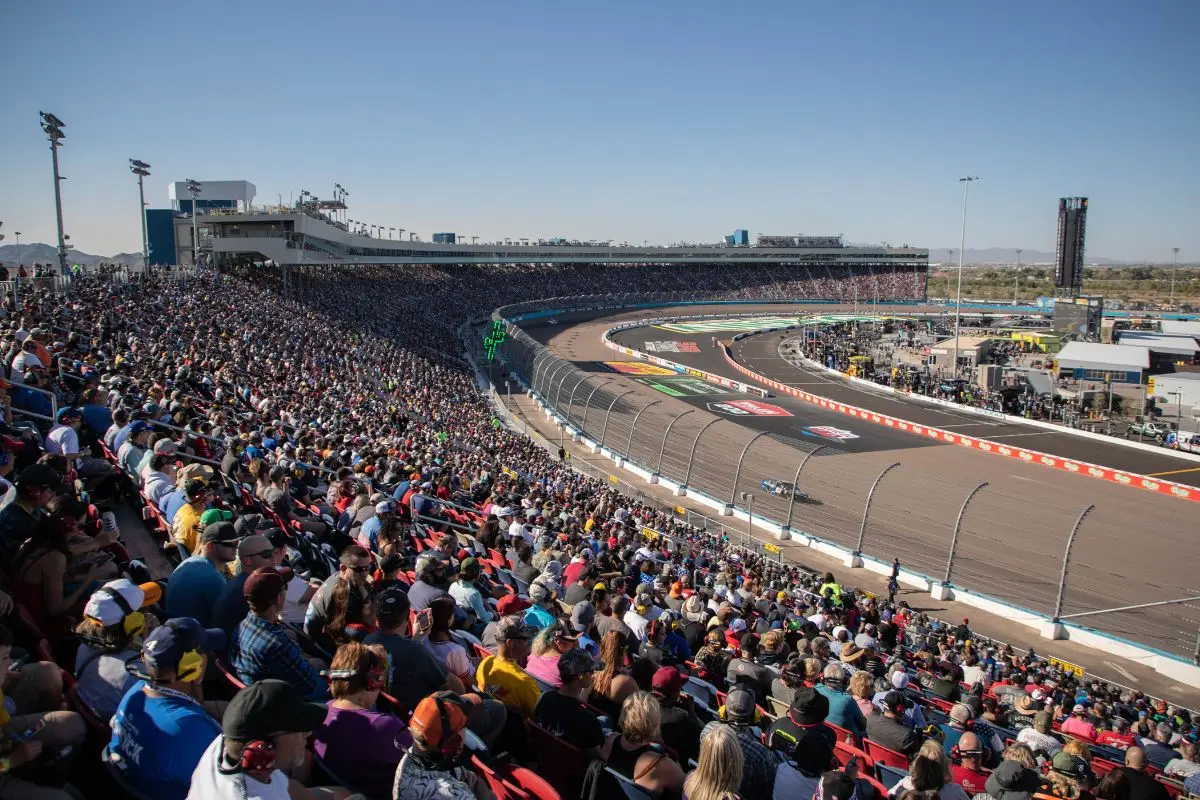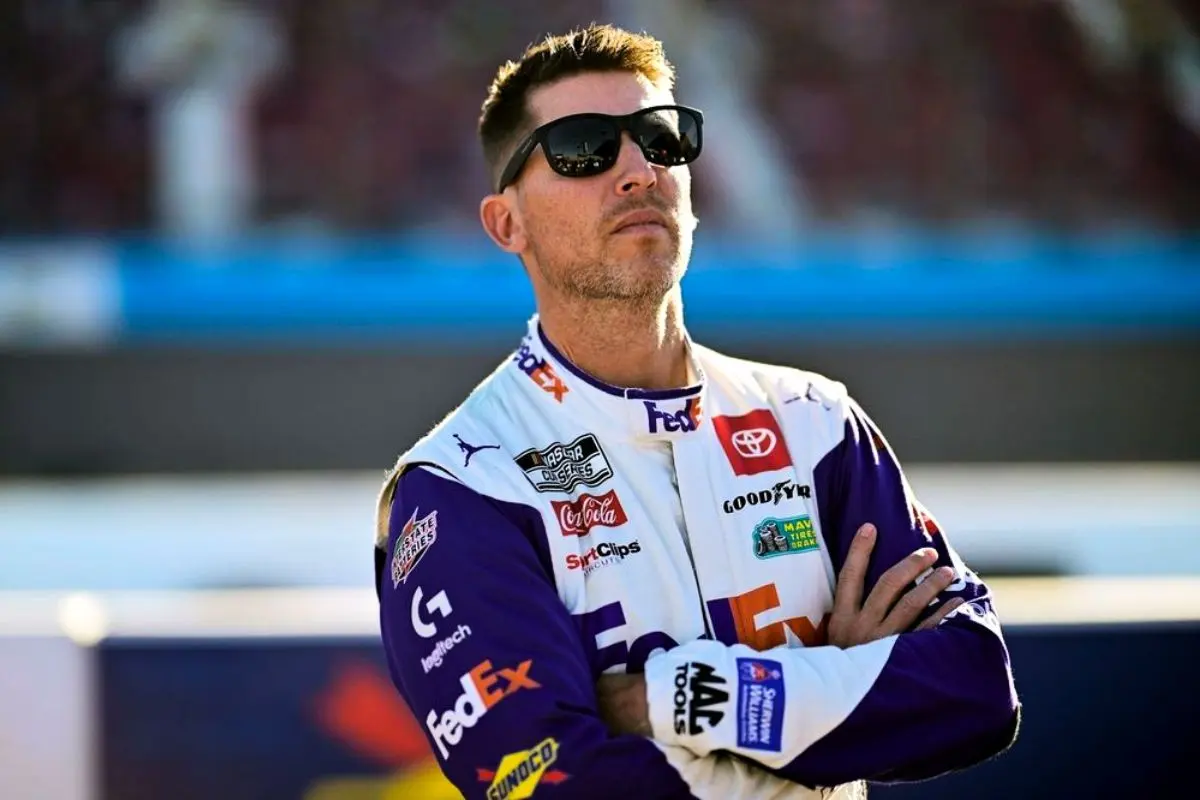Steve Letarte Calls Phoenix Race ‘Sleepy’ criticizing the lack of tire falloff that diminished excitement. He stressed the need for improvements in the short-track package to boost competition. In contrast, Denny Hamlin defended the race, attributing its shortcomings to car design limitations rather than the track itself. He argued that Phoenix has the potential for thrilling races but requires modifications to vehicle specifications to increase overtaking opportunities. This disagreement highlights ongoing concerns in NASCAR regarding short-track racing dynamics.
Key Highlights
- Steve Letarte criticized the Phoenix race for being “sleepy,” citing insufficient tire falloff as a factor for reduced excitement.
- Denny Hamlin defended the race, attributing the lack of action to car design limitations rather than the track itself.
- Letarte demands improvements in the short-track package to enhance overall race engagement and excitement.
- Hamlin suggests modifying car aerodynamics and performance to emulate the more competitive Xfinity Series racing.
- The debate highlights a broader issue in NASCAR regarding how car design impacts competition and viewer engagement at short tracks.
NASCAR Short-Track Package in 2024: Mixed Results
The NASCAR short-track package for the 2024 season has yielded a variety of outcomes, reflecting potential and challenges inherent in the format. The season commenced with a thrilling Bristol spring race, where notable tire wear prompted NASCAR to allocate an extra set of tires to teams, emphasizing the demanding nature of short-track competition.
However, subsequent events, particularly the following Richmond race, fell short of expectations, characterized by a lack of excitement and a predictably linear race outcome, with three drivers dominating the laps.
A striking contrast emerged during the playoff race at Bristol, where Kyle Larson‘s commanding performance, leading 462 of 500 laps, left many spectators underwhelmed despite the victory.
The narrative of mixed results continued at Martinsville, where unexpected tire falloff introduced a dynamic element, resulting in a more engaging race. This instance highlighted the capacity for intense drama, often absent in other short-track events throughout the season.
Notably, the seasoned perspective of a NASCAR veteran critiquing the finale as mediocre further emphasizes the ongoing discourse regarding the short-track package’s efficacy.
NASCAR Short-Track Race at Phoenix
Many fans were left on the edge of their seats during the NASCAR short-track race at Phoenix, particularly as the final stage started with intense battles among the frontrunners. The race highlighted remarkable moments, including Tyler Reddick’s bold four-wide move, which nearly led to a major incident.
This excitement intensified as pit strategies played a vital role; William Byron’s decision to stay out for an extra 10 laps proved fortuitous when a timely caution allowed him to regain the lead.
However, the final segment was not without its drama. Christopher Bell’s pursuit of Byron resulted in a gripping side-by-side duel, only for Joey Logano to capitalize on their battle with a daring three-wide move for the lead.
The showdown between Logano and his teammate Ryan Blaney emphasized the competitive nature of the event, with Blaney finishing a mere 0.33 seconds behind Logano, the eventual champion.

Despite these thrilling moments, the race raised questions regarding NASCAR’s short-track package. The dominance of only two drivers, with Bell leading 143 laps and Logano leading 107 of the 312, suggests a lack of diversity in leadership that could hinder overall excitement.
Steve Letarte Critiques Phoenix Race and Short-Track Package
While acknowledging the entertainment value of the recent NASCAR race at Phoenix, Steve Letarte expressed reservations regarding the general competitiveness and structure of the event during his discussion with Denny Hamlin on the ‘Actions Detrimental’ podcast.
“I do need a little something different at Phoenix, though. Like, I’ll be the first guy, so I hate when I see a good race; everybody says it was a bad race, and the drivers, you know, Denny and I will disagree on those at times because from where he sits, sometimes it isn’t a good race, but I’m from the fan standpoint I’m like I disagree that was entertaining. This one was a little sleepy right like a second a falloff wasn’t really enough.” – (Steve Letarte)
Letarte characterized the race as “a little sleepy,” highlighting his concern over insufficient tire falloff, which he believed detracted from the general excitement and competitiveness. Letarte’s critique emphasizes a broader issue within the NASCAR short-track package, suggesting that while some may view the racing at Phoenix as satisfactory, there remains notable room for improvement.
He pointed out that the prevailing sentiment within the NASCAR community—that the Phoenix race is the best one can expect—should not inhibit the pursuit of enhancements. Citing the recent resurgence of racing at Martinsville, which he described as the best in five years, Letarte argued for an ongoing evolution of the Phoenix race format.
“I think that’s easy to say it can always be better. They said the same thing about Martinsville and that was the best Martinsville we’ve had in 5 years…Here’s my thing I don’t think that you’re going to change Phoenix and it’s going to all a sudden race like Miami because it’s not it’s Phoenix.” – (Steve Letarte)
He contended that it is crucial to acknowledge that every race can be better, irrespective of whether it was deemed good or bad. This perspective challenges the notion that the current configuration of Phoenix is beyond refinement.
“This is like the crew-chief driver argument all the time right like you can always be faster trust me well the race can always be better it doesn’t have to even be a bad race. Like I don’t I wouldn’t label this as a bad race I just wouldn’t leave saying okay that’s good enough I think it needs to be worked on.” – (Steve Letarte)
Denny Hamlin’s View on Phoenix and NASCAR’s Car Problem
Amidst discussions surrounding the recent Phoenix race, Denny Hamlin has identified a critical issue impacting the quality of competition: the current car design. As a seasoned driver with a notable short-track history, Hamlin contends that the limitations imposed by the existing vehicle specifications detract from the racing experience, particularly at venues like Phoenix, which he believes possesses the potential for thrilling competition.
Hamlin’s performance in the Phoenix race, where he started from 14th and ultimately finished 11th, emphasizes his frustration. He expressed a deep appreciation for the track’s unique layout, which allows for multiple racing lines and dynamic restarts. However, he lamented that the current car design stifles the excitement that fans expect from a championship event.
“It’s a great venue. I hate it that the racing is not better because it’s a great racetrack. The layout’s very unique it gives us some options on restarts we got we’re racing multiple lanes. But it’s we have a car problem right and we’re trying to fix it through some other things.” – (Denny Hamlin)
In Hamlin’s view, the issues at Phoenix are not merely a matter of driver skill or strategy but are fundamentally tied to the car’s performance attributes. As he succinctly put it, “we have a car problem right and we’re trying to fix it through some other things.”
This assertion highlights the necessity for an examination of the vehicle specifications to improve competitiveness and ultimately uplift the fan experience, particularly at venues designated for intense events.
Denny Hamlin’s Proposed Fix and Future of NASCAR’s Short-Track Package
Denny Hamlin’s proposed solution for improving NASCAR’s short-track package centers on the need to increase the interaction between the rear and front cars, drawing inspiration from the Xfinity Series. He argues that the current design of the Cup cars limits the ability of the trailing car to affect the handling of the leading car, thereby stifling overtaking opportunities.
“We can talk about what the fix is but I believe in my heart of hearts we got to get the back of the cars up so the rear car can manipulate the spoiler of the front car. Like the Xinity cars but right now we’re just we plant the back and then you just it there’s no effect that the rear car has on the front car.” – (Denny Hamlin)
By raising the rear of the cars, Hamlin believes that drivers will be able to manipulate the front car’s spoiler more effectively, mimicking the dynamic seen in Xfinity races where passing is more frequent.
“We’ve got to make it to where the back car can manipulate the front car, that’s how passes get made um 90% of Xfinity passes get made. By someone’s just jamming their nose right behind somebody gets them loose boom goes on.” – (Denny Hamlin)
As NASCAR prepares for the 2025 season, particularly with the schedule changes that remove a short-track race, it becomes imperative to address the challenges of the current car design.
The Phoenix race, slated as the season finale, highlights the urgency of this conversation. Without notable improvements to the short-track package, the potential for thrilling racing may continue to wane, leaving fans and competitors yearning for a more competitive environment.
News in Brief: Steve Letarte Calls Phoenix Race ‘Sleepy’
The recent commentary surrounding the Phoenix race highlights differing perspectives on NASCAR’s short-track package. Steve Letarte’s critique emphasizes the race’s lack of excitement, labeling it as “sleepy,” while Denny Hamlin offers a defense, demanding modifications to improve competitive dynamics.
Both viewpoints highlight the ongoing challenges faced by NASCAR in engaging audiences and enhancing race quality. The discourse surrounding proposed solutions indicates a continued focus on refining the short-track experience within the sport.
ALSO READ: Steve Letarte’s Bold NASCAR Playoff Overhaul Promises Thrilling Action and Controversy in the Sport


